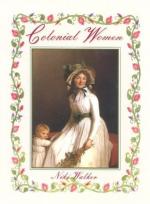|
This section contains 1,994 words (approx. 7 pages at 300 words per page) |

|
Life Cycles.
Certain rituals in colonial America marked the stages of a person's life from birth to death. For the majority of colonists these included infant baptisms, weddings, and funerals. Other rituals, such as admission to full church membership for Puritans, communion for Anglicans or Presbyterians, or believer's baptism for Anabaptists, further served to mark important passages in life. Wherever infant baptism was practiced in colonial America it served both to confer certain religious benefits on the newborn and to initiate him or her into a particular position within the local community, a position sometimes signified by the person who stood as the baby's guardian or godparent. While baptisms were religious ceremonies with minimal celebration attached, weddings might or might not be considered religious affairs and were almost always occasions for large communal festivities. Anglicans in Virginia and elsewhere viewed weddings as...
|
This section contains 1,994 words (approx. 7 pages at 300 words per page) |

|




